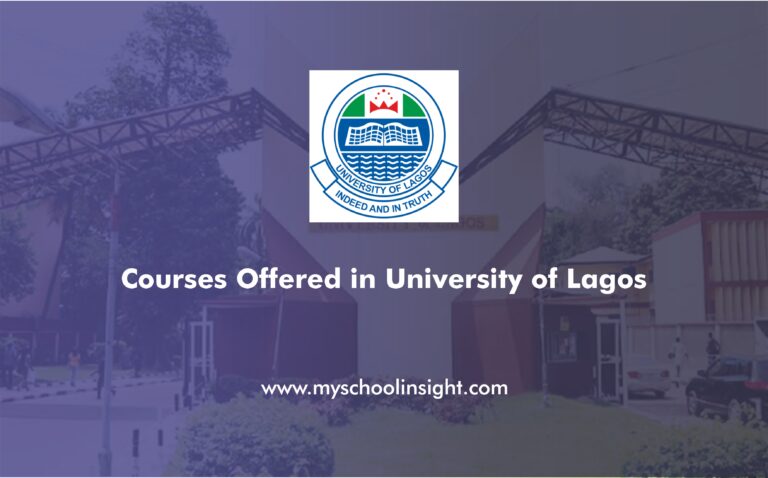Top Accredited Courses to Study in Nigerian Universities (2025 Guide)

Introduction
In Nigeria, entry into the university is a great event in the life of a learner. There are many opportunities in the field of courses and institutions as there are more than 150 approved universities (federal, state, and private). Not every available course is recognized and able to render the students ready to the dynamic employment environment of today.
The accreditation of courses of study, career relevance, employability and professional recognition must be valuable selection criteria when considering a course of study. The National Universities Commission (NUC) is the statutory institution in Nigeria which controls academic courses and accredits them to be able to attain the minimum academic standards. Units that are not accredited by the NUC or professional bodies may not be accepted by NYSC or when screening one to other professional exams, employment and international opportunities.
This guide will explain the best NUC approved courses to pursue in Nigerian universities, how relevant it is in the 21 st century economy, regulatory needs, employment opportunities, and the best universities where they are available.
Understanding Accreditation: What It Means and Why It Matters
Before diving into the best courses, it’s important to understand why accreditation is essential. Accreditation is the official approval granted by the NUC and sometimes additional professional bodies that allows a university to offer a particular course legally and competently.
Benefits of Accredited Courses:
- Eligibility for NYSC upon graduation
- Recognition of degrees by employers and postgraduate institutions
- Access to professional certifications (e.g., COREN, ICAN, NMCN)
- Assurance of curriculum quality and teaching standards
- Improved chance of international acceptance for studies or work
NUC accreditation is reviewed periodically, and programs may be listed as “Full Accreditation,” “Interim Accreditation,” or “Denied.” It is the responsibility of every student to check the current status of their intended course before applying.
Top Accredited Courses to Study in Nigerian Universities
Below is a breakdown of the most respected, career-aligned, and NUC-accredited undergraduate programs in Nigerian universities. The list reflects fields with high professional value, strong local and global relevance, and regulatory body approvals.
1. Medicine and Surgery
- Regulatory Bodies: NUC, Medical and Dental Council of Nigeria (MDCN)
- Duration: 6 years + 1-year internship
- Career Paths: Doctor, Surgeon, Physician, Public Health Officer, Medical Educator
Medicine is the most competitive major and one of the most renowned across the world in Nigeria. Applications are received every year and mostly the numbers of candidates are thousands and only a few percentage of the candidates get admission because of the quote and strict requirements.
With a degree in Medicine and Surgery you get to become a registered doctor following a period of internship and registration with the MDCN. There is already a high rate of emigration of Nigerian medical doctors to places where they are in great demand such as in the whole world, and the rate is rising after the COVID era.
Top Institutions:
- University of Ibadan (UI)
- University of Lagos (UNILAG)
- Ahmadu Bello University (ABU)
- University of Nigeria, Nsukka (UNN)
- Lagos State University (LASU)
- Babcock University
2. Law
- Regulatory Bodies: NUC, Council of Legal Education (CLE)
- Duration: 5 years + 1-year Law School
- Career Paths: Lawyer, Barrister, Solicitor, Corporate Counsel, Human Rights Advocate
Law is a prestigious course that spans multiple career domains including litigation, legislation, corporate governance, policy, and human rights. To practice law in Nigeria, you must first attend an NUC-approved law faculty and then complete a year at the Nigerian Law School.
Top Institutions:
- University of Ilorin (UNILORIN)
- University of Lagos (UNILAG)
- University of Benin (UNIBEN)
- Obafemi Awolowo University (OAU)
- Afe Babalola University (ABUAD)
3. Pharmacy
- Regulatory Bodies: NUC, Pharmacists Council of Nigeria (PCN)
- Duration: 5 years + 1-year internship
- Career Paths: Pharmacist, Medical Sales Rep, Clinical Pharmacologist, Research Scientist
Pharmacy is a critical aspect of healthcare. Graduates must complete an internship and pass the PCN licensure exam to practice professionally. Demand for pharmacists in hospitals, pharmaceutical companies, and regulatory agencies remains high.
Top Institutions:
- University of Benin (UNIBEN)
- University of Jos (UNIJOS)
- Olabisi Onabanjo University (OOU)
- UNN, Nsukka
- Madonna University (Private)
4. Nursing Science
- Regulatory Bodies: NUC, Nursing and Midwifery Council of Nigeria (NMCN)
- Duration: 5 years
- Career Paths: Registered Nurse, Midwife, Clinical Specialist, Nurse Educator
Nursing is one of the most sought-after programs in Nigeria and internationally. It is ideal for students interested in care delivery, maternal health, and community medicine. Nigeria’s export of nurses to countries like the UK and Canada has grown significantly in the past five years.
Top Institutions:
- University of Calabar (UNICAL)
- Babcock University
- University of Jos (UNIJOS)
- Bowen University
- Nnamdi Azikiwe University (UNIZIK)
5. Engineering (All Disciplines)
- Regulatory Bodies: NUC, COREN
- Duration: 5 years
- Career Paths: Civil Engineer, Electrical Engineer, Mechanical Engineer, Structural Engineer
Engineering is essential to Nigeria’s infrastructural development. The Council for the Regulation of Engineering in Nigeria (COREN) oversees professional licensing of engineering graduates. Only COREN-accredited programs qualify for registration.
Top Specializations:
- Civil Engineering
- Mechanical Engineering
- Electrical and Electronics
- Petroleum Engineering
- Mechatronics
Top Institutions:
- University of Ilorin (UNILORIN)
- Covenant University
- Federal University of Technology, Minna (FUTMINNA)
- Obafemi Awolowo University (OAU)
- Federal University of Technology, Akure (FUTA)
6. Computer Science / Software Engineering
- Regulatory Bodies: NUC, CPN
- Duration: 4 years
- Career Paths: Software Developer, Data Scientist, Systems Analyst, Cybersecurity Expert
With Nigeria becoming Africa’s largest tech ecosystem, Computer Science and Software Engineering are among the most market-relevant degrees. These courses offer opportunities in fintech, mobile app development, blockchain, artificial intelligence, and more.
Top Institutions:
- Covenant University
- UNILAG
- Nile University
- Obafemi Awolowo University (OAU)
- University of Abuja
7. Accounting and Finance
- Regulatory Bodies: NUC, ICAN, ANAN
- Duration: 4 years
- Career Paths: Chartered Accountant, Auditor, Investment Analyst, Financial Controller
Accounting is a reliable business discipline with steady job demand. Most students combine it with professional qualifications such as ICAN, ACCA, or CFA to improve job competitiveness.
Top Institutions:
- University of Lagos (UNILAG)
- University of Nigeria (UNN)
- Covenant University
- Lagos State University (LASU)
- University of Benin (UNIBEN)
8. Mass Communication / Media Studies
- Regulatory Body: NUC
- Duration: 4 years
- Career Paths: Journalist, Public Relations Officer, Content Creator, Media Consultant
Mass Communication is evolving in the digital space. Graduates can specialize in traditional media, digital marketing, brand storytelling, or journalism.
Top Institutions:
- University of Nigeria, Nsukka (UNN)
- Caleb University
- University of Ilorin (UNILORIN)
- Redeemer’s University
- Baze University
9. Architecture
- Regulatory Bodies: NUC, ARCON
- Duration: 5 years + 1-year professional training
- Career Paths: Architect, Urban Designer, Interior Decorator, Construction Consultant
Architecture combines technical drawing, design, and engineering. It’s one of the highest-earning professions with freelance and government prospects.
Top Institutions:
- University of Lagos (UNILAG)
- Federal University of Technology, Akure (FUTA)
- Covenant University
- Ahmadu Bello University (ABU)
- UNN, Nsukka
10. Education Courses (All Majors)
- Regulatory Bodies: NUC, Teachers Registration Council of Nigeria (TRCN)
- Duration: 4 years
- Career Paths: Teacher, Curriculum Developer, Educational Psychologist, Principal
With increased emphasis on teacher professionalism, Education degrees are now more recognized and in demand. Specializations include:
- Science Education
- Guidance & Counselling
- Educational Administration
- Early Childhood Education
Top Institutions:
- University of Ibadan (UI)
- Tai Solarin University of Education (TASUED)
- University of Abuja
- UNILORIN
- Adekunle Ajasin University
Additional High-Value Courses (With Accreditation)
Here are more NUC-accredited programs with growing market relevance:
- Public Health – for those interested in community-based health solutions
- Medical Laboratory Science – supports diagnostic processes in healthcare
- Estate Management – relevant for property development and valuation
- Political Science / International Relations – ideal for policy, governance, and diplomacy
- Business Administration / Marketing – suited for entrepreneurship and commerce
- Agricultural Science – gaining importance in food security and agribusiness
- Quantity Surveying – essential for budgeting in construction projects
How to Check Course Accreditation
To confirm whether a course is accredited in any university, follow these steps:
- Visit the NUC official portal – www.nuc.edu.ng
- Click on the “Approved Programmes” tab
- Search for your course and university
- Check if it shows “Full Accreditation” or “Interim Accreditation”
- For professional fields, verify via professional councils (e.g., COREN, NMCN, PCN, CLE)
Never enroll in a program listed as “Denied Accreditation.” Graduating from such programs may disqualify you from NYSC, employment, or further studies.
Conclusion
Choosing that good course to study is all about accreditation, relevance to the career, employability and sustainability of that particular course and not necessarily the popularity or the prestigiousness of that course. This manual has featured the best accredited professional courses in Nigerian universities which do not just confer a degree but offer a starting block in being a successful professional.
Research the course, make sure that it is accredited and see that it fits your objectives before making an application. Accreditation is not just a regulatory mark but a mark of value and recognition of possibilities in the future after graduating.






One Comment